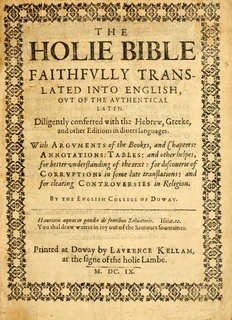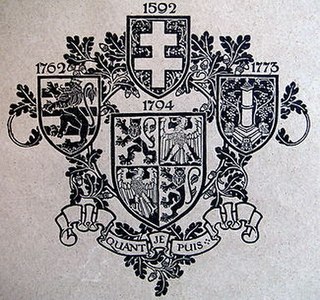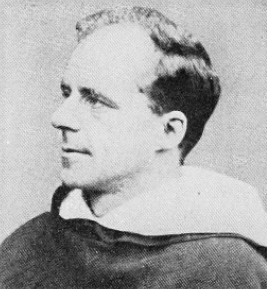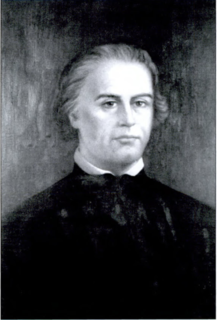
Douai is a commune in the Nord département in northern France. It is a sub-prefecture of the department. Located on the river Scarpe some 40 kilometres from Lille and 25 km (16 mi) from Arras, Douai is home to one of the region's most impressive belfries. The population of the metropolitan area, including Lens, was 552,682 in 1999.
William James Bloye was an English sculptor, active in Birmingham either side of World War II.

The Douay–Rheims Bible, also known as the Douay–Rheims Version, Rheims–Douai Bible or Douai Bible, and abbreviated as D–R, DRB, and DRV, is a translation of the Bible from the Latin Vulgate into English made by members of the English College, Douai, in the service of the Catholic Church. The New Testament portion was published in Reims, France, in 1582, in one volume with extensive commentary and notes. The Old Testament portion was published in two volumes twenty-seven years later in 1609 and 1610 by the University of Douai. The first volume, covering Genesis through Job, was published in 1609; the second, covering Psalms to 2 Machabees plus the three apocrypha books of the Vulgate appendix following the Old Testament was published in 1610. Marginal notes took up the bulk of the volumes and had a strong polemical and patristic character. They offered insights on issues of translation, and on the Hebrew and Greek source texts of the Vulgate.

Richard Challoner was an English Roman Catholic bishop, a leading figure of English Catholicism during the greater part of the 18th century. The titular Bishop of Doberus, he is perhaps most famous for his revision of the Douay–Rheims translation of the Bible.

St Edmund's College is a coeducational independent day and boarding school in the British public school tradition, set in 440 acres (1.8 km2) in Ware, Hertfordshire. Founded in 1568 as a seminary, then a boys' school, it is the oldest continuously operating and oldest post-Reformation Catholic school in the country. Today it caters for boys and girls aged 3 to 18.
The English College, was a Catholic seminary in Douai, France, associated with the University of Douai. It was established in 1568, and was suppressed in 1793. It is known for a Bible translation referred to as the Douay–Rheims Bible. Of over 300 priests from Douai sent on the English mission, about one-third were executed. The dissolution of the college at the time of the French Revolution led to the founding of Crook Hall near Lanchester in County Durham, and St Edmund's College, Ware. It is popularly believed that the indemnification funds paid by the French for the seizure of Douai's property were diverted by the British commissioners to complete the furnishings of George IV's Royal Pavilion at Brighton.
Hugh Tootell was an English Catholic historian. He is commonly known under his pseudonym Charles Dodd.
Thomas Haydock (1772–1859), born of one of the oldest English Catholic Recusant families, was a schoolmaster and publisher. His dedication to making religious books available to fellow Catholics suffering under the English Penal Laws came at great personal cost. He is best remembered for publishing an edition of the Douay Bible with extended commentary, compiled chiefly by his brother George Leo Haydock. Originally published in 1811 and still in print, it is one of the most enduring contributions to Catholic biblical studies.

A Catholic Bible is a Christian Bible that includes the whole 73-book canon recognized by the Catholic Church, including the deuterocanon—a term used by some scholars and by Catholics to denote the books of the Old Testament which are in the Greek Septuagint collection but not in the Hebrew Masoretic Text collection.
Francis Davenport, O.M.R., also known as Father Francis of Saint Clare, was an English Catholic theologian, a Recollect friar and royal chaplain.

The Colleges of St Omer, Bruges and Liège were successive expatriate institutions for the Catholic education run by the Jesuits for English students.
John Bodey was an English Roman Catholic academic jurist and lay theologian. He was martyred in 1583, and beatified in 1929.
Gabriel Gifford OSB was an English Roman Catholic Benedictine monk who became Archbishop of Reims.
George Musket, alias Fisher was an English Roman Catholic priest and controversialist. On the English mission he was under sentence of death for around 20 years, but survived.
George Leyburn was an English Catholic priest, who became President of the English College, Douai.

Henry Vincent Pope, better known as Fr. Hugh Pope (1869–1946), was an English Dominican biblical scholar, Professor of New Testament Exegesis at the Pontificium Collegium Internationale Angelicum, the future Pontifical University of Saint Thomas Aquinas, Angelicum in Rome.

Robert Plunkett was an English Catholic priest and Jesuit missionary to the United States who became the first president of Georgetown College. Born in England, he was educated at the Colleges of St Omer and Bruges, as well as at the English College at Douai. There, he entered the Society of Jesus in 1769, but left four years later, just before learning of the papal order suppressing the Society. Therefore, he was ordained a secular priest at the English College, and became the chaplain to a monastery of English Benedictine nuns in exile in Brussels.
Robert Witham (1667–1738) was an English Roman Catholic college head and biblical scholar.
James Haydock (1764?–1809) was a Catholic recusant priest who served during the waning years of the Penal Period in England and died a martyr to charity while attending the sick of his congregation during an epidemic.